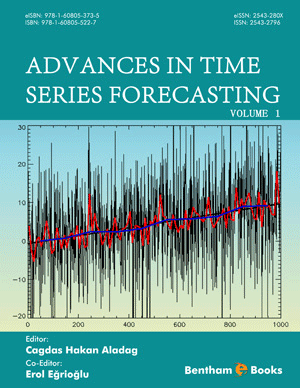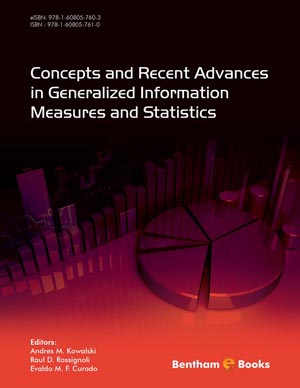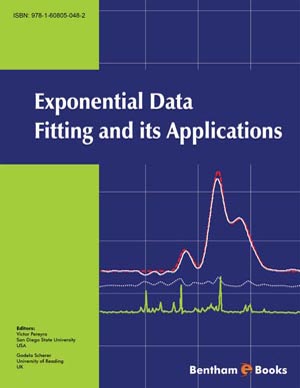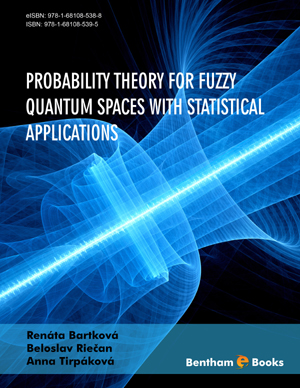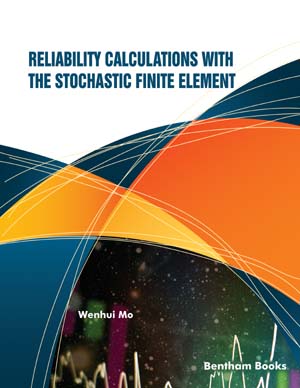Preface
Page: ii-iv (3)
Author: Gauss M. Cordeiro, Rodrigo B. Silva and Abraão D. C. Nascimento
DOI: 10.2174/9781681083452120010002
Introduction
Page: 1-25 (25)
Author: Gauss M Cordeiro, Rodrigo B Silva and Abraão D. C Nascimento
DOI: 10.2174/9781681083452120010003
PDF Price: $30
Abstract
This chapter presents mathematical and statistical background for understanding this book. Some results and formulae presented in this chapter are revisited in the next chapters. Initially, important survival analysis concepts are de ned and issues with respect to inference and statistical methods. Subsequently, several special functions are presented. The chapter ends with some discussions on statistical elements that will be used in the rest of the book.
Exponentiated Models
Page: 26-52 (27)
Author: Gauss M. Cordeiro, Rodrigo B. Silva and Abraão D. C. Nascimento
DOI: 10.2174/9781681083452120010004
PDF Price: $30
Abstract
The exponentiation transform of cumulative distributions can furnish more exible models. Such procedure generates the exponentiated G (exp-G) distributions. This chapter presents a survey on the exp-G models and its mathematical properties. In particular, explicit expressions for the quantile function, ordinary and incomplete moments, generating function, income measures, order statistics and entropies are addressed.
Beta Generalized Models
Page: 53-86 (34)
Author: Gauss M. Cordeiro, Rodrigo B. Silva and Abraão D. C. Nascimento
DOI: 10.2174/9781681083452120010005
PDF Price: $30
Abstract
The beta transformation gives a great variety of shapes which allow to model symmetric, skewed and bimodal shaped densities. Such procedure generates what we call the beta generalized (beta-G) family of distributions. This chapter presents a survey on the beta-G models and their mathematical properties. We present some explicit expressions for the ordinary and incomplete moments, probability weighted moments, cumulants and generating function, mean deviations, entropies and order statistics.
Special Generalized Beta Models
Page: 87-98 (12)
Author: Gauss M. Cordeiro, Rodrigo B. Silva and Abraão D. C. Nascimento
DOI: 10.2174/9781681083452120010006
PDF Price: $30
Abstract
In this chapter, we provide theoretical essays about five special models in the beta family. For each model, its cdf, pdf and hrf have explicit forms, which can be utilized for determining some mathematical properties. Two applications are performed in order to illustrate the exibility of the densities under discussion.
The Kumaraswamy's Generalized Family of Models
Page: 99-114 (16)
Author: Gauss M. Cordeiro, Rodrigo B. Silva and Abraão D. C. Nascimento
DOI: 10.2174/9781681083452120010007
PDF Price: $30
Abstract
This chapter addresses the Kumaraswamy's generalized (\Kw-G" for short) family of models. A physical motivation for the Kw-G family is presented and some of its special cases are discussed in detail. This family receives a baseline distribution as input and returns a new distribution with two additional parameters. The returned model is often more exible than the baseline one. Several structural properties are presented and discussed for the Kw-G family. Among them, useful expansions, mgf, moments and mean deviations. Additionally, estimation and generation procedures are presented.
Special Kumaraswamy Generalized Models
Page: 115-148 (34)
Author: Gauss M. Cordeiro, Rodrigo B. Silva and Abraão D. C. Nascimento
DOI: 10.2174/9781681083452120010008
PDF Price: $30
Abstract
In this chapter, three special cases of the Kumaraswamy generalized family of distributions are presented. Some mathematical characteristics are provided such as the moments and generating function. An expanded expression for the density function and some special cases are presented. For illustrative purposes, practical examples of the KwG models are reported by means of applications to empirical data.
The Gamma-G Family of Distributions
Page: 149-177 (29)
Author: Gauss M. Cordeiro, Rodrigo B. Silva and Abraão D. C. Nascimento
DOI: 10.2174/9781681083452120010009
PDF Price: $30
Abstract
This chapter presents the gamma generalized family of distributions proposed by Zofragos and Balakrishnan (2009). Several mathematical properties are provided such as representations for gamma-G density and cumulative functions, some generalized moments, quantile and generating functions and entropies. A bivariate generalization is presented. An application is performed in order to illustrate empirically the usefulness of this family.
Recent Compounding Models
Page: 178-199 (22)
Author: Gauss M. Cordeiro, Rodrigo B. Silva and Abraão. D. C Nascimento
DOI: 10.2174/9781681083452120010010
PDF Price: $30
Abstract
In this chapter, we introduce a family of models de ned by compounding two (a continuous and other discrete) distributions. The new family has as limiting case the adopted baseline distribution. The generated models are frequently more exible than the baseline distributions. Several mathematical properties such as moments, quantile and generating functions, among others, are provided. Further, the estimation procedure is approched by maximum likelihood. The potentiality of the family of models is illustrated by means of two applications to real data.
Conclusions and Recent Advances
Page: 200-203 (4)
Author: Gauss M. Cordeiro, Rodrigo B. Silva and Abraão D. C. Nascimento
DOI: 10.2174/9781681083452120010011
PDF Price: $30
Bibliography
Page: 204-223 (20)
Author: Gauss M. Cordeiro, Rodrigo B. Silva and Abraão D. C. Nascimento
DOI: 10.2174/9781681083452120010012
Subject Index
Page: 223-232 (10)
Author: Gauss M. Cordeiro, Rodrigo B. Silva and Abraão D. C. Nascimento
DOI: 10.2174/9781681083452120010013
Introduction
Introduction: Mathematicians and statisticians have made significant academic progress on the subject of distribution theory in the last two decades, and this area of study is becoming one of the main statistical tools for the analysis of lifetime (survival) data. In many ways, lifetime distributions are the common language of survival dialogue because the framework subsumes many statistical properties of interest, such as reliability, entropy and maximum likelihood. Recent Advances in Lifetime and Reliability Models provides a comprehensive account of models and methods for lifetime models. Building from primary definitions such as density and hazard rate functions, this book presents readers a broad framework on distribution theory in survival analysis. This framework covers classical methods - such as the exponentiated distribution method – as well as recent models explaining lifetime distributions, such as the beta family and compounding models. Additionally, a detailed discussion of mathematical and statistical properties of each family, such as mixture representations, asymptotes, types of moments, order statistics, quantile functions, generating functions and estimation is presented in the book. Key Features: - presents information about classical and modern lifetime methods - covers key properties of different models in detail - explores regression models for the beta generalized family of distributions - focuses information on both theoretical fundamentals and practical aspects of implementing different models - features examples relevant to business engineering and biomedical sciences Recent Advances in Lifetime and Reliability Models will equip students, researchers and working professionals with the information to make extensive use of observational data in a variety of fields to create inferential models that make sense of lifetime data.




